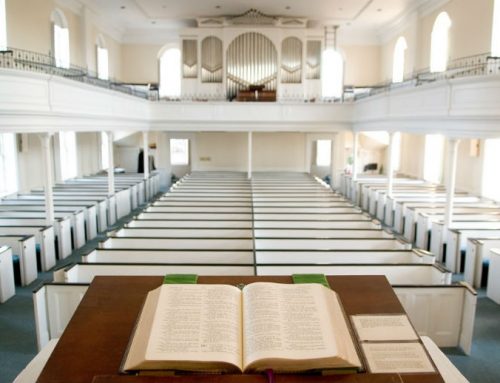Author’s Note: I wrote this almost a whopping five years ago, and it’s one of two posts that drives most of the most new traffic to our site. If that’s you…welcome! Make yourself at home! I’m re-publishing it under today’s date so it appears for more folks to read and comment.
Blessings – Jeff V., April 2, 2021
So…one of the first questions every Presbyterian seems to get is…what up with that business of predestination? It’s like the stray dog that seems to follow you everywhere. Do Presbyterians believe that God has determined everything – like fate? And if that’s true, how is there any room for human free will? All questions that have vexed many a believer and theologian for centuries – and I approach with some fear and trembling. It’s a bit of a long one here…sorry.
As I hope you’ll see, the doctrines of free will and of predestination are not simple – but there is one key thing you should keep in mind as you think about them. All these theological ideas are rooted in one solid, bedrock belief at the heart of Reformed (Presbyterian) theology: God is in charge of life – of your life, my life, all of life – and God’s love is larger than we can imagine or apply human reason to. Put that at the top of your notebook. It’s all about God’s sovereignty – God being in charge – and God finding a way to love human beings into becoming who they truly are: children of God. How it all works is a mystery that we can never fully make sense of with our human reason. It’s like looking at the broad vast universe with the cheap telescope you bought at Radio Shack: you know there’s a lot more there, but this is all you can see with your eyes. Theology is the cheap telescope, and your unreliable eyes; God is the vast expanse you’re trying to see.
So…yet another difference between Presbyterians and Catholics and other denominations has to do with how we think of salvation. That term itself deserves a lot of explanation, because it doesn’t just mean, “who gets to go to heaven,” or “who is on God’s team.” It’s often referred to in scripture as eternal life: a life you can experience now, but that has implications for…well, forever. But the question is – who gets saved? Do the people who choose God, out of their own putative “free” will, get saved? A baptist would heartily agree with this – just confess Jesus as your Lord and Savior, and go ahead and try to be a Christian. For Presbyterians, not so fast. We have a very radical idea about God’s love. There’s nothing we can do to get it – it’s of such a nature that it must be freely given, and not earned or controlled by you in any way. You don’t choose it – you can’t. It chooses you.
So maybe you could think of it this way. Your spouse says, “You didn’t say thank you for the amazing paint job I did with our room.” Response: “Oh – yes! You did a fantastic job painting our bedroom, honey!” We’ve all been there, yes? Not terribly satisfying. That wouldn’t really be “thank you.” But if I receive that compliment unbidden, it’s a much more powerful form of grace, a kind of love that comes to us despite anything we do or say. This is God’s form of love. It’s of such a nature that we can’t even choose it – in fact, there’s nothing that we can do to deserve or get that kind of love, except (an important except) trust it’s already there, have faith in its presence. We can’t get it by being good people, we can’t get it by giving to the United Way, we definitely can’t get it by buying a piece of paper from the Catholic church. Nada. It’s given for free, regardless of our virtue, our good looks, our church attendance, or our bank account.
What? you might say. Nothing required to get the best thing life can offer – a life with God, eternal life? I don’t have to do anything?
Yup. That’s right. That’s the good news. Christian life then emanates from a sense of gratitude for what God has already done for us, before we could choose it, and furthermore it cannot be undone. Did you get that last bit? Predestination has to do with that – God has already determined your purpose in this life – that it will be for God. If that’s what God chooses, it can’t be undone. You just have to trust it, and live out of that bliss.
Now, this is where things get complicated. If that’s true, said the early Calvinists, what about those people who don’t seem to “get it?” Who don’t seem to participate in the life-transforming power of Christ’s love? It must be that God has predetermined that they will not be on the good-guy or good-gal team when the eternal bell rings. It must be that God has predestined them for a different life (or fate?)
This is a vexing question, and there are no easy answers. But the key thing is to remember that God’s love is always to seek good for every human being. Human beings are the ones who reject this goodness, over and over. And if God’s in charge, it looks like God just let’s this happen – holocaust, Boko Haram, Jeffrey Dahmer…if God’s in charge, we might think God intends for this to be the case. But there are some theologians – like Karl Barth – who would argue that we simply can’t see how God’s love might be operating even in the lives of people who look for all intents and purposes to be totally anti-God. Could God save Hitler? We don’t know. But the tragectory of God’s love, mysterious as it is, would have us hope that God will work salvation in everyone, even though we can’t ever know.
And that’s the point – the important point. We can’t know who’s on God’s team, and what often messes us up is thinking we do. We exclude people (gays and lesbians, for example, until recently, and even now there’s still some dispute), thinking we’re on the right side, they’re on the wrong. Bottom line: I don’t decide who receives heaven. God does. I can’t even choose it. God has chosen it for me.
So – what about the whole question of free will then?
And then there’s that subject – free will. A little post-script on that. Above, I’ve talked about how God’s love is of such a nature that it must be given, we must simply trust that it’s there for us and live out of that gratitude. God chooses whom God wills, because God’s in charge. But is God in charge of everything? Did God determine that I would buy Goat’s Milk from Walmart yesterday (fun digression: Walmart is the only store around that carries it; it’s delicious).
The answer is no. God doesn’t dabble in those sorts of details. God doesn’t control us like a puppeteer. In fact, God’s saving love does the opposite thing for us. God’s salvation enables us truly to have freedom, to be free.
Without going into too much detail, one other bedrock idea of Presbyterian theology – and all Christian theologies – has to do with the doctrine of sin. Sin is often thought of as a behavior – fundamentally, it’s not; it results in behavior that we often call “sinful.” Sin is actually a condition, like polio or diabetes, or acne. We’re born with it. It’s a propensity to do evil. It’s a defect that keeps getting transmitted – just like if the mint messed up the one mold that makes all the coins out in circulation. This is what the story of Adam and Eve explains. The Firesign Theater puts it this way: “We’re all bozos on this bus.”
That seems rather depressing, but it doesn’t need to be. First of all, if we realize that we human beings are all messed up, and it’s not totally our fault – our parents’ did it! – then we have a more realistic expectation about life. We’re all sinners. We are all little children trying to get our needs met, often screaming on the inside but looking like well-behaved adults on the outside. No one is perfect – in fact no one can be. We all fall way short of the kind of creatures we were originally designed to be: perfectly content and loving, and grateful to our creator. It all starts with admitting – like in the 12 step programs – we are powerless over the power of sin.
But here’s the good news – there’s a cure! What is it? You guessed it: God’s grace, God’s healing love. How do we get that? Not by being good boys and girls. Simply by trusting it. Going back to the 12-step model: we get it by trusting in a power greater than ourselves to save us from the power of alcohol/drugs/gambling/sex. Addiction is in fact a good analog to the way we think of sin.
So – getting to my point now. What is it that truly gives us the ability to be free? Grace, freely given. God’s grace is the only power capable of restoring our broken human will, which by itself is incapable of being free. Can we truly be free if we live under “sin” – under compulsion, say, to have another five drinks, or gamble away our 401K? That’s not freedom – we are totally enslaved in our illusion freedom. We are free to mess ourselves up. The only cure for sin is true freedom, which we only receive through the redeeming love of God. That kind of love enables us truly to be free, to be healed – a process that doesn’t happen all at once, but through a process we call sanctification (“making holy/whole), a lifelong journey with God.
Make sense? You’re confused? OK – keep looking through the telescope…!


